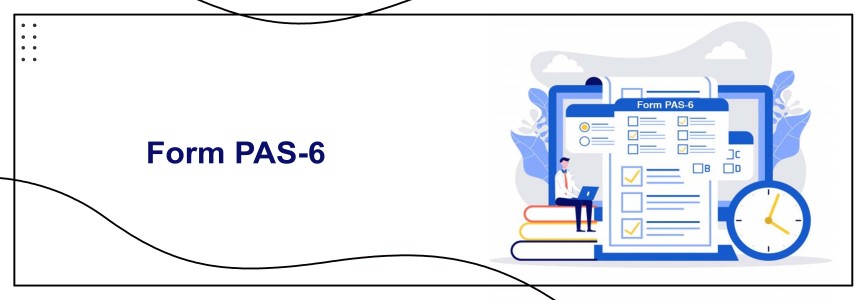The Ministry of Corporate Affairs (MCA) is making company compliance more transparent and digital. Earlier, only unlisted public companies had to keep their shares in Demat form (from 2nd October 2018). But through the Companies (Prospectus and Allotment of Securities) Second Amendment Rules, 2023, the MCA has now made it mandatory for Non-Small Private Limited Companies to also dematerialise their shares. These rules will now apply from 30 June 2025 (extended from 30 September 2024). Companies must convert their existing shares into Demat form and ensure that any future issue or transfer of shares is done only through Demat. Along with this, the MCA requires unlisted public companies to file Form PAS-6, a half-yearly report that helps reconcile and verify their share capital. In simple terms, PAS-6 ensures that the number of shares a company has issued, allotted, and dematerialised is accurate and matches official records. This article explains the purpose, applicability, and filing process of Form PAS-6 in a clear and easy way.
Background of Form PAS-6
Form PAS-6 was introduced to keep the digital record of shares in India. The MCA notified this form on 10 September 2018 through the Companies (Prospectus and Allotment of Securities) Third Amendment Rules, 2019. This amendment added Rule 9A(8), making it compulsory for unlisted public companies to issue all their securities only in Demat form from 2 October 2018. The purpose behind this change is to reduce fraud, increase transparency, and maintain accurate shareholder records. Earlier, many unlisted companies used physical share certificates, which were often misused, lost, or disputed. Dematerialisation of shares removes these risks and ensures clear, safe, and easily traceable ownership of shares.
What is Form PAS-6?
Form PAS-6 is a half-yearly compliance form that unlisted public companies must file with the Registrar of Companies (ROC). It works as a Share Capital Reconciliation Audit, where the company reports and compares:
-
Its total issued share capital
-
Shares held in physical form
-
Shares held in Demat form with NSDL and CDSL
-
Any changes in share capital during the period
Purpose of PAS-6
The filing of Form PAS-6 serves several important purposes that help maintain accuracy, transparency, and discipline in the management of a company’s share capital. Each objective plays a key role in improving corporate governance for unlisted public companies.
Ensuring that issued shares match the depository records
PAS-6 helps verify that the number of shares a company claims to have issued exactly matches the shares recorded with NSDL and CDSL. This ensures there is no mismatch, over-issue, or unrecorded allotment, which could otherwise lead to fraud or disputes among shareholders.
Identifying discrepancies or errors in share capita
Sometimes, errors happen in records such as duplicate entries, missing shares, or incorrect Demat conversions. PAS-6 helps detect: Differences between physical and dematerialised shares, Shares not properly credited to investors and Mistakes due to outdated or incomplete records. Early identification helps the company correct issues and maintain accurate share capital information.
Ensuring compliance with dematerialisation rules
The government wants all unlisted public companies to shift away from physical share certificates. PAS-6 ensures that companies: - Convert outstanding physical shares into Demat, Issue new shares only in Demat form and Follow Rule 9A of the Companies Act strictly. This supports the broader goal of a fully digital securities system.
Promoting transparency in shareholding records
Demat records are clear, traceable, and tamper-proof. By filing PAS-6 regularly, companies maintain transparent: Ownership details, Share movements (transfers, allotments, etc.) and Updated shareholding patterns.
This transparency protects investors and reduces the chances of manipulation or hidden transactions.
Applicability of Form PAS-6
Form PAS-6 applies to all unlisted public companies, irrespective of the size of share capital or number of shareholders. However, the following companies are exempt from filing PAS-6:
-
Nidhi Companies
-
Government Companies
Rule 9A – Issue of Securities in Dematerialised Form
To understand PAS-6, it is necessary to understand Rule 9A, which governs how unlisted public companies issue and handle their shares.
Under this rule:
All securities must be issued only in dematerialised form
From 2 October 2018, unlisted public companies are not allowed to issue physical share certificates. Every new share issued must be in Demat form only. This prevents misuse, loss, and manipulation of physical share certificates.
Company must enable dematerialisation of all its existing securities
The company must take necessary steps to help shareholders convert their old physical shares to Demat. This includes:
-
Applying to NSDL or CDSL (India’s two depositories)
-
Getting an ISIN for each type of security (equity, preference, etc.)
-
Providing full support to shareholders who want to dematerialise shares
-
Informing all existing shareholders that Demat facility is available
Directors, Promoters, and KMP must hold shares only in Demat form
Before the company can take certain major corporate actions, its:
-
Directors
-
Promoters
-
Key Managerial Personnel (KMPs)
This is required before the company:
-
Issues new shares
-
Does a buyback
-
Issues bonus shares
-
Issues rights shares
-
Approves any other corporate action involving securities
Transfer or subscription of shares after 2 October 2018
After this date: If a shareholder wants to transfer shares, the shares must be in Demat form.
No one can transfer physical share certificates anymore. If a shareholder wants to subscribe to new shares (such as bonus, rights issue, private placement, etc.), they must first dematerialise all their existing shares.
Why Form PAS-6 is Important
Compliance with PAS-6 is more than just filing a form. It ensures:
-
Accurate share capital records
-
Elimination of mismatches between company records and depositories
-
Prevention of false share certificates or fraudulent capital increase
-
Investor protection
-
Corporate transparency
-
Smooth transactions in the securities market
Contents of Form PAS-6
Form PAS-6 requires detailed information regarding the company’s capital and dematerialisation status. The main contents include:Company Details
This section captures basic information about the company, such as:
-
Company name, registered address, and email ID
-
ISIN (International Securities Identification Number) for each class of security (equity, preference, etc.)
Share Capital Details
In this section, the company must report its total issued share capital, along with how those shares are held:
-
Shares in NSDL (Demat)
-
Shares in CDSL (Demat)
-
Shares held in physical form
Details of Changes in Share Capital
For the half-year being reported, the company must disclose all changes made to its share capital, such as:
-
Rights shares
-
ESOP allotments
-
Private placements
-
Conversion of securities
-
Amalgamation/merger
-
Buyback of shares
-
Capital reduction
-
Forfeiture of shares
-
Any other change
Shareholding of Directors, Promoters & KMP
The company must provide details of shares held by:
-
Directors
-
Promoters
-
Key Managerial Personnel (KMP)
-
Number of shares in physical form
-
Number of shares in Demat form
Demat Request Details
This section records the status of dematerialisation requests received from shareholders:
-
Total number of demat requests received
-
Requests approved within 21 days
-
Requests pending for more than 21 days, along with the reason for delay
Professional Certification
The form must be certified by either:
-
A Practising Company Secretary (PCS), or
-
A Practising Chartered Accountant (CA)
-
Membership number
-
Certificate of Practice (COP) number
Due Dates for Filing PAS-6
Form PAS-6 is filed twice every year. The due dates are:
| Half-Year Period | Due Date |
| April – September | 29 November |
| October – March | 30 May |
Step-by-Step Process of Filing Form PAS-6
The filing process is simple if the company maintains proper share capital records.
Step 1: Download the Form PAS-6
Go to the MCA website, open the “Forms” section, and download the PAS-6 e-form.
Step 2: Fill Basic Company Information
In this part, enter simple company details like:
-
CIN (Company Identification Number)
-
Company name
-
ISIN number(s)
-
Period for which you are filing (April–September or October–March)
-
Total share capital
Step 3: Enter Share Capital Reconciliation Data
Here, you compare the total number of shares the company has issued with the number of shares:
-
In NSDL
-
In CDSL
-
In physical form
Step 4: Add Details of Any Changes in Share Capital
If the company issued or cancelled any shares during the half-year, you need to mention it here—for example:
-
New allotment
-
Transfer
-
Buyback
-
Rights issue
-
Bonus issue
-
Merger/demerger impact
Step 5: Provide Shareholding of Promoters, Directors & KMPs
You must report whether:
-
Promoters
-
Directors
-
Key Managerial Personnel (KMPs)
Step 6: Enter Details of Pending Demat Requests
If any shareholder has applied to convert physical shares into Demat but the process is pending, enter:
-
Number of shares
-
Date of request
-
Reason for delay
Step 7: Attach Digital Signatures
The form must be digitally signed (DSC) by one of the following:
-
Director
-
CEO
-
CFO
-
Company Secretary
-
DIN for directors
-
PAN for CEO/CFO
-
Membership number for Company Secretary
Step 8: Certification by Practising CA/CS
A Practising Chartered Accountant (CA) or Practising Company Secretary (PCS) must digitally certify that:
-
The details are correct
-
Records have been checked
-
Share capital data is accurate
Step 9: Upload the Form on MCA Portal & Pay Fees
Upload the form on the MCA portal and then Pay the filing fees (fee depends on the authorised share capital of the company) Once payment is successful, PAS-6 is considered filed.
Penalties for Non-Compliance
Not filing Form PAS-6 on time or failing to comply with Rule 9A can create serious problems for a company. The consequences include:
Additional Fees
If the form is filed late, the company must pay extra fees as prescribed by the MCA.The longer the delay, the higher the additional fee.
Penalties Under the Companies Act, 2013
If the company does not file PAS-6 at all or repeatedly defaults, the Registrar of Companies (ROC) may impose monetary penalties on:- The company
- Officers in default (directors, CS, CFO, etc.)
These penalties can increase if the non-compliance continues.
Possible Disqualification of Directors
If a company fails to meet filing requirements over a long period, the directors may face disqualification under Section 164 of the Companies Act for persistent non-compliance.
MCA Notices or Legal Action
The Ministry of Corporate Affairs (MCA) may issue:-
Show cause notices
-
Compliance orders
-
Prosecution for serious or repeated violations
This can damage the company’s credibility and legal standing.
Restrictions on Corporate Actions
If a company delays dematerialisation or does not follow Rule 9A:
-
It cannot issue new shares
-
It cannot issue bonus or rights shares
-
It cannot carry out a buyback
-
It may face delays in share transfers or approvals
Final Word
Form PAS-6 is an important compliance requirement that helps unlisted public companies keep their share records clean, correct, and transparent. It makes sure that the number of shares a company has issued matches exactly with what is recorded in NSDL and CDSL. This reduces the chances of mistakes, fraud, or confusion about who owns how many shares. With the government making dematerialisation compulsory, PAS-6 helps companies stay updated and follow Rule 9A properly. By filing this form every six months, companies show that their shareholding records are accurate and that their promoters, directors, and key staff are also holding their shares in Demat form. Timely filing of PAS-6 protects the company from penalties, legal issues, and delays in corporate actions like issuing bonus shares, rights shares, or buyback. It also increases trust among investors because everything is recorded digitally and verified by a professional. In simple words, PAS-6 keeps a company’s share capital clean, correct, and transparent which is good for compliance, good for investors, and good for the company’s image.
Frequently Asked Questions (FAQs)
Q1. What is Form PAS-6?
Ans. Form PAS-6 is a half-yearly report filed by unlisted public companies to match their issued share capital with the records of NSDL and CDSL. It ensures the accuracy of shareholding data.
Q2. Who needs to file Form PAS-6?'
Ans. All unlisted public companies must file PAS-6, except:
-
Nidhi companies
-
Government companies
-
Wholly-owned subsidiaries
Q3. How often is PAS-6 filed?
Ans. It is filed twice every year:- For April–September → by 29 November
- For October–March → by 30 May
Q4. Is PAS-6 applicable to private limited companies?
Ans. No. PAS-6 applies only to unlisted public companies. However, after the 2023 amendment, Non-Small Private Companies must dematerialise shares, but they still do not file PAS-6.
Q5. Who certifies Form PAS-6?
Ans. The form must be certified by:A Practising Company Secretary (PCS)
or A Practising Chartered Accountant (CA)
Q6. What happens if a company does not file PAS-6 on time?
Ans. Late filing leads to:-
Extra fees
-
Penalties on the company and its officers
-
Possible MCA notices
-
Problems in doing corporate actions like bonus, rights issue, buyback
Q7. What details are required in PAS-6?
Ans. The form includes:
-
Company details
-
ISIN
-
Share capital data
-
Shares in NSDL, CDSL, physical form
-
Changes in share capital
-
Promoter/Director shareholding
-
Pending demat requests
Q8. Why is PAS-6 important?
Ans. It helps maintain clean and accurate share capital records and prevents fraud, duplication, or mismatches between company records and depositories.
Q9. Do directors and promoters need to hold shares in Demat form?
Ans. Yes. Under Rule 9A, all shares of:- Directors
- Promoters
- KMPs
must be fully dematerialised before certain corporate actions.
Q10. Can a company issue physical share certificates now?
Ans. No. After 2 October 2018, unlisted public companies can issue securities only in Demat form. Physical certificates are no longer allowed.











































































_crop10_thumb.jpg)


































































_crop10_thumb.jpg)
_crop10_thumb.jpg)



_crop10_thumb.jpg)


_crop10_thumb.jpg)





_crop10_thumb.jpg)

_crop10_thumb.jpg)














-suratgujarat-section-158_crop10_thumb.jpg)
-suratgujarat_crop10_thumb.jpg)
-(33)_crop10_thumb.jpg)



-ahmedabad_crop10_thumb.jpg)
-learn_crop10_thumb.jpg)

-learnn_crop10_thumb.jpg)



























































_crop10_thumb.jpg)























_Guidelines_learn_crop10_thumb.jpg)























_learn_crop10_thumb.jpg)
_crop10_thumb.jpeg)










_crop10_thumb.jpg)




_Second_Amendment_Rules,_2025_learn_crop10_thumb.jpg)







_learn_crop10_thumb.jpg)












































_learn_crop10_thumb.jpeg)























_learn_crop10_thumb.jpg)



_rd_roc_learn_crop10_thumb.jpg)
















_learn_crop10_thumb.jpg)














_learn_crop10_thumb.jpg)
_Learn_crop10_thumb.jpg)










































_learn_crop10_thumb.jpg)




_learn_crop10_thumb.jpg)













_crop10_thumb.jpeg)


















